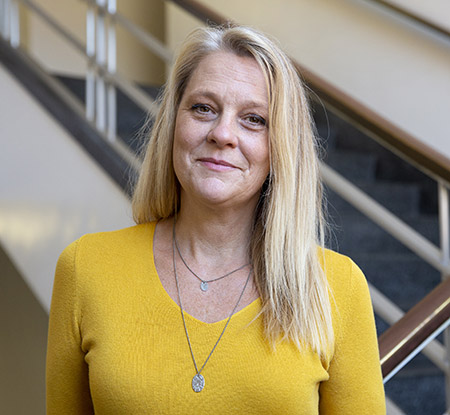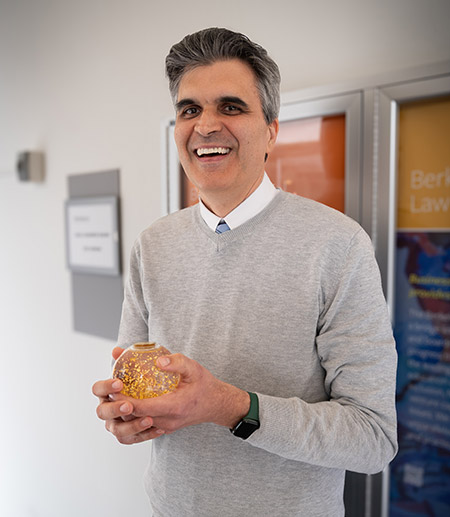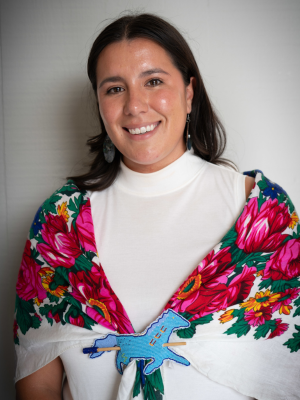By Gwyneth K. Shaw
Two Berkeley Law faculty members have been honored for their extraordinary classroom skills: Seth Davis with the school’s Rutter Award for Teaching Excellence and Kristen Holmquist with a UC Berkeley Distinguished Teaching Award.
The Rutter Award has been given annually to a law professor since 1995, while the Distinguished Teaching Award recognizes a small group of faculty — five this year — from across the university for “sustained excellence in teaching.”

Holmquist is the 18th member of the law school faculty to be recognized and fourth to receive a campus-wide award in the last five years: Professors Andrea Roth and Andrew Bradt were honored in 2019 and 2022, while Professor Molly Van Houweling won a special Extraordinary Teachers in Extraordinary Times award in 2021.
Professors must be nominated for the campus-wide award, which also requires instructors to submit some course materials and be observed by multiple former winners — in Holmquist’s case, Roth was one of them. Holmquist says she was thrilled just to be nominated by Dean Erwin Chemerinsky, but her emotions hit a whole other level when she got the news she’d won late on a Friday night.
“I don’t think I knew until it happened how good it would feel to have master teachers recognize me as deserving,” she says. “I know the students and I have a good relationship with them. But to have people who are not part of that relationship watch and say what you’re doing in the classroom works and is important and just felt amazing.”
Davis expressed similar sentiments about being recognized within the Berkeley Law faculty, particularly by the remarks of two students, Kelsey Lutgen ’24 and Cameron Washington ’25, who talked about him at a law school celebration in April.
“It was very moving to receive the Rutter Teaching Award,” he says. “I was especially honored listening to the students who spoke.”
Holmquist and Davis exemplify the Berkeley Law faculty’s dedication to excellence in the classroom, Chemerinsky says.
“The Distinguished Teaching Award is the highest recognition by the campus for outstanding teaching. Kristen Holmquist is a terrific teacher and a very deserving recipient of this award. She cares deeply about the learning of each student and in helping each to find a path in the law,” he says. “Seth Davis is a natural born teacher. He excels in challenging students to think and in clearly communicating difficult material. He is a wonderful mentor to students, outside as well as inside the classroom.”
Top-notch tactics
Holmquist, also the faculty director of the school’s Experiential Education Program, came to Berkeley Law in 2008 to bolster the Academic Support Program, which provides academic advising and skills training for law students during their first and most rigorous academic year. She quickly built a reputation as a student favorite, both in the classroom and in her mentoring and support roles, and was a faculty speaker at the 2014 graduation and won a Rutter Award in 2017.
She teaches two core law courses — Constitutional Law and Estates and Trusts — but has also built out a sub-curriculum focused on helping students develop the skills and emotional resilience to be good lawyers and happy people. This spring, for example, Holmquist and Van Houweling taught Satisfaction in Law and Life, which drew from a variety of sources to explore what makes some lawyers unhappy and how to avoid joining those ranks.
Holmquist thinks what her students value most is that she believes they can learn and cares deeply that they do. That helps build trust, she says, and it’s a two-way street — but once that bond is there, it’s unshakable.
“They know that I am 100% there to support them, that the reason I am in that classroom is to help them develop as learners and lawyers,” she says. “I have high standards, and I know they can meet them. I’m going to make them do hard stuff and entertain hard ideas, but they’re going to be supported along the way. There will be scaffolding.”
Recent graduate Traelon Rodgers ’24, who both took courses with Holmquist and worked as her teaching assistant, says that holistic approach is what makes her special.
“She teaches more than traditional doctrine — she goes the extra mile with assignments and supplemental classes that help students understand what to expect on law school exams in her skills-based Con Law class, how to pass the bar in her problem-solving class, and how to be a happy and healthy practitioner in her satisfaction in law class,” he says. “As if being a great professor isn’t enough, she is a wonderful advisor and boss. She has helped so many students matriculate through law school and into the profession and continues to have contact with them.”

Davis, too, has developed a strong rapport with students, and says he particularly relishes the moments when he and his students collectively create a new insight through class discussion. He joined the faculty in 2018 and regularly teaches Federal Courts and Torts.
A prominent Indian Law scholar, Davis is also the faculty director of the new Center for Indigenous Law and Justice, which began last fall. He teaches courses in the field, serves as the faculty supervisor for the student-led Native American Legal Assistance Project, and supported students as they revived Berkeley Law’s Native American Law Students Association (NALSA) chapter.
He developed a course, Thirteen Ways of Looking at a Case, to introduce students to the major schools of legal theory as they’re applied to canonical cases in the core law school curriculum.
“For me, teaching is learning. What do I mean when I say that teaching is learning? Well, first, I mean something about teaching doctrinal classes in law school, which is what I do. And, second, I mean something about any sort of teaching,” Davis says. “First, it turns out that you don’t really know what you think about a doctrinal subject until you teach it. That’s one way in which teaching is learning.
“Second, I strive for clarity, active learning and giving feedback, and critical thinking in my teaching. I work for a classroom environment in which students can learn with me and with one another.”
Building a supportive environment
Lutgen spent a lot of time with Davis: He was her Federal Indian Law course professor and advised her independent study project during her 3L year. Lutgen, who’s active in NALSA, also worked extensively with him through that group.
“Presenting Professor Davis with the Rutter Award was a huge honor and it gave me great joy to share how positively he has impacted my experience at Berkeley Law,” she says. “Professor Davis brings a level of compassion, empathy, and humility to the classroom that is uncommon among law school professors. Among the many other responsibilities he juggles as an academic, an appellate advocate, and a father, his commitment to the classroom demonstrates that he takes teaching and mentorship very seriously.

“He is humble, he is kind, and he is one of the greatest teachers I’ve had the pleasure of learning from. Some of my most cherished law school memories are sitting on the steps of Heymann Terrace in the beautiful Bay Area spring, listening to Professor Davis lecture in Federal Indian Law office hours.”
Anya Ku ’20, who wrote one of the letters supporting Holmquist’s nomination for the campus-wide award, describes her as “the model of practical, inclusive, and effective teaching” — a professor who dives into the discomfort of seminal cases in constitutional law and makes space for students to share their experiences reading and living through those decisions. Holmquist helped Ku separate the world into “bar exam” and “practice,” allowing her to grasp the academic skills needed for law school while acknowledging the mass of other talents she’d bring to her legal work.
Ku describes a moment during her 1L year when a personal crisis left her doubting her ability to be a lawyer. Holmquist “turned this doubt into drive,” Ku says.
“She invited me to her office and let me cry it out. When I was done, she reminded me that I was doing a hard thing, a thing that no one in my family had done before, so there were going to be hard times,” Ku says. “She gave me hope; she told me that every student she counseled through these doubts came out stronger. I trusted her as a teacher in the classroom, so I trusted her as a teacher in life, too.
“As a first-generation, woman of color lawyer, the legal world was not built for me. Through law school and in practice, I’ve learned how easy it is to be overcome by feelings of imposter syndrome, incompetence, and inadequacy. But through the guidance of Professor Holmquist, I’ve learned what a difference a great teacher makes.”